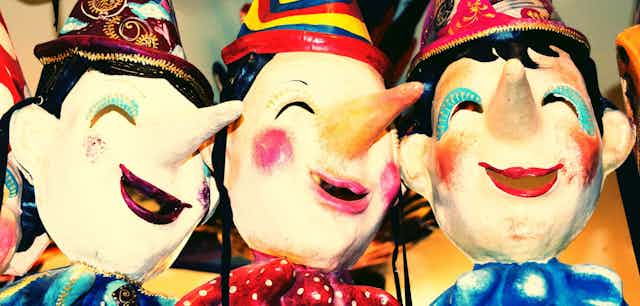On Friday, Sept. 8, “Third Rail with OZY” opened by asking: “Is truth overrated? Is lying the American way?”

Of course, lies have long been a big part of American politics, but fibs, tall tales and whoppers also affect our home and work lives.
We searched The Conversation archive for stories that explore how, why and when people lie – and what happens as a result.
Do you lie – and why?
Liars aren’t born – but they do start early.
Gail Heyman is a professor of psychology at the University of California, San Diego who studies how children as young as three-and-a-half years old need to develop before they can become successful liars. Heyman acknowledges the corrosive power of lying on relationships, organizations and institutions. But she also admits that lying is “a source of great social power, as it allows people to shape interactions in ways that serve their interests: They can evade responsibility for their misdeeds, take credit for accomplishments that are not really theirs, and rally friends and allies to the cause.”
Have you ever harnessed this “great social power” by telling a lie?
If you answered “no,” perhaps that’s true, but perhaps that’s just something you mistakenly believe – a falsehood.
Ronald W. Pies, a clinical professor of psychiatry at Tufts University School of Medicine, walked us through the difference between those two terms.
Someone “who deliberately misrepresents what he or she knows to be true is lying – typically, to secure some personal advantage,” Pies writes. “In contrast, someone who voices a mistaken claim without any intent to deceive is not lying. That person may simply be unaware of the facts, or may refuse to believe the best available evidence. Rather than lying, he’s stating a falsehood.”
Parsing lies from falsehoods requires us to understand another person’s motivation. That’s tricky business anytime – but it gets more complicated when the speaker you’re scrutinizing is the president of the United States.
Into the political realm
Donald Trump, of course, embraced what Kellyanne Conway later dubbed “alternative facts” in the first official act of his presidency – his inauguration speech.
During the speech, Trump claimed that unemployment went up under President Obama. It didn’t, as researchers at the University of Florida point out, but 67 percent of Trump’s supporters believed it at the time. Such misinformation contributes to Americans’ sense that there is a “reality gap” between conservatives and liberals in the United States.
But UF’s Lauren Griffin writes that these far-fetched claims aren’t “lies,” but something she sees as much more dangerous – bullshit.
Griffin quotes the philosopher Harry Frankfurt as explaining that a bullshitter “does not care whether the things he says describe reality correctly. He just picks them out, or makes them up, to suit his purpose.”
Of course, “politically motivated skepticism of science is certainly not new,” as Elizabeth Suhay, an assistant professor of government at American University, observed. Trump didn’t invent the divide between scientists and politicians – or between science and policy.
“Science is consistently a political target precisely because of its political power,” Suhay writes. “The problem for science and evidence-based policy comes when politicians and other political actors decide to discredit the science on which a conclusion is based or bend the science to support their policy position. Call it "policy-based evidence” as opposed to “evidence-based policy.”
Could an embrace of “policy-based evidence” harm U.S. credibility in the world?
One example to consider is how the world reacted when American leadership turned its back on settled climate science and withdrew from the Paris Agreement. But perhaps embracing such hard truths is overrated.
Do you disagree? Make your voice heard in Third Rail’s online poll or tweet with the hashtag #ThirdRailPBS.

